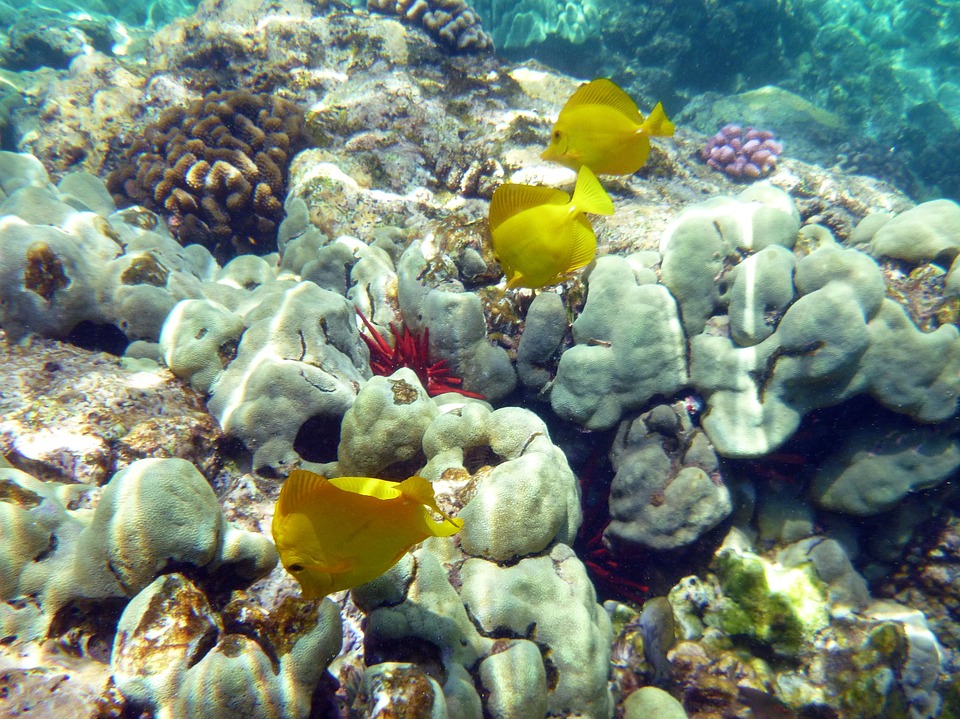
The most iconic aquarium fish from Hawaiis’ aquarium fishery, Yellow Tangs graze on a Hawaiian Coral Reef. For the moment, a Hawaii Supreme Court ruling means that not a single one will be harvested for the aquarium trade. Image credit: Photographer unknown, CC0 1.0
On the evening of Wednesday, September 6th, Hawaii’s State Supreme Court issued a ruling that effectively halts Hawaii’s commercial aquarium fisheries for the foreseeable future.
This is the result of a court battle that has been escalating for five years, led by the Humane Society of the United States (HSUS) and the Center for Biological Diversity (CBD), along with individual petitioners, most notably Rene Umberger (For The Fishes), who charged in a 2012 lawsuit that Hawaii’s Department of Land and Natural Resources (DLNR) is required to conduct an environmental review under Hawaii Environmental Policy Act (HEPA) before issuing aquarium fish collection permits to commercial and recreational aquarium fishermen.
Reversing decisions of the lower courts, Hawaii’s Supreme Court ruled that commercial aquarium fish collection is subject to HEPA requirements, and as such, issued an injunction to halt the collection of aquarium fishes until the proper environmental review is conducted. It is not yet clear how and when this closure will be enacted and enforced. The Court was less clear on whether the recreational collection of aquarium fishes is subject to these same requirements and directed the lower courts to review and rule on that matter.
From the ruling:
On remand, the circuit court is directed to grant Petitioners’ summary judgment motion to the extent that Petitioners are requesting declaratory relief and a prohibitory injunction as to commercial aquarium collection pursuant to permits issued under HRS § 188-31 and DLNR’s administrative rules. Further proceedings are necessary, however, in order to determine whether Petitioners are entitled to declaratory relief and a prohibitory injunction as to recreational aquarium collection permits.
The Court did issue another statement of note; it determined that environmental review is not required for each individual commercial aquarium fishing permit, but only the activity as a whole.
We note that HRS § 343-5(g) (Supp. 2012) provides that agencies, in preparing an environmental assessment, “may consider and, where applicable and appropriate, incorporate by reference, in whole or in part, previous determinations of whether a statement is required and previously accepted statements.” HRS 343-5(g) (Supp. 2012). A similar authority, derived from HRS § 343-5, exists in HAR § 11-200-13(a) (effective 1996), providing “that whenever an agency proposes to implement an action or receives a request for approval, the agency may consider and, when applicable and appropriate, incorporate by reference, in whole or in part, previous determinations of whether a statement is required, and previously accepted statements.” These provisions alleviate the concern that an environmental assessment would necessarily have to be prepared whenever an applicant applies for an aquarium collection permit. Further, “a group of proposed actions may be treated by a single environmental assessment or statement,” HRS § 343-6(a)(1) (2010), when “[t]he actions in question are essentially identical and a single statement will adequately address the impacts of each individual action and those of the group of actions as a whole,” HAR § 11-200-7 (effective 1985). Such an approach can assuage concerns about aquarium collectors not having the resources to comply with HEPA. We note that HRS § 343-5(g) (Supp. 2012) provides that agencies, in preparing an environmental assessment, “may consider and, where applicable and appropriate, incorporate by reference, in whole or in part, previous determinations of whether a statement is required and previously accepted statements.” HRS 343-5(g) (Supp. 2012). A similar authority, derived from HRS § 343-5, exists in HAR § 11-200-13(a) (effective 1996), providing “that whenever an agency proposes to implement an action or receives a request for approval, the agency may consider and, when applicable and appropriate, incorporate by reference, in whole or in part, previous determinations of whether a statement is required, and previously accepted statements.” These provisions alleviate the concern that an environmental assessment would necessarily have to be prepared whenever an applicant applies for an aquarium collection permit. Further, “a group of proposed actions may be treated by a single environmental assessment or statement,” HRS § 343-6(a)(1) (2010), when “[t]he actions in question are essentially identical and a single statement will adequately address the impacts of each individual action and those of the group of actions as a whole,” HAR § 11-200-7 (effective 1985). Such an approach can assuage concerns about aquarium collectors not having the resources to comply with HEPA.
Review and download the complete Hawaii Supreme Court ruling here: http://law.justia.com/cases/hawaii/supreme-court/2017/scwc-13-0002125.html
Permits Frozen
In response, the Hawaii Department of Land and Natural Resources (DNLR) has announced that it is issuing no new fishing permits for aquarium species and will not renew existing permits as they expire. (DNLR permit statement.)
Further announcements about the future of the state’s aquarium fishery are expected.
Updates To Come
We know aquarists and members of the marine aquarium trade will be concerned by this news, which raises many questions about the future of Hawaii’s aquarium fishery.
CORAL Magazine will share further details, reactions, and updates, as they are made available. Watch our homepage (www.Reef2Rainforest.com), sign up for our email newsletter, and follow us on Facebook and Twitter so you don’t miss the next important update.
Additional Reading:
Hawai‘i Supreme Court Orders Halt of Commercial Aquarium Fishery – Star Tribune
Commercial Catching Of Aquarium Fish Halted By Hawaii Supreme Court – Civil Beat
Ruling halts commercial scooping of Hawaii aquarium fish – Miami Herald




